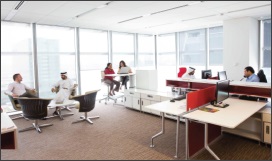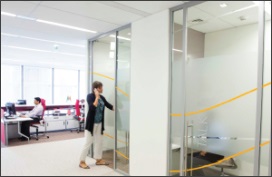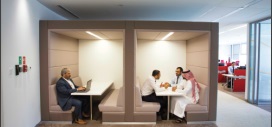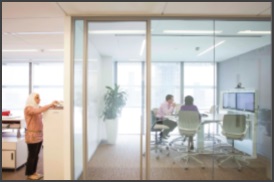
by Chris Congdon — When the global energy company TAQA decided to create a new corporate headquarters facility in Abu Dhabi, company leaders knew that it needed to be a place where people could come together, collaborate and share the benefits of an inspiring environment. At the same time, employees throughout the ranks were expressing concerns about losing their privacy in a more collaborative, open-plan environment.
“Like many businesses in the Arabic world, our people had been used to a working environment where there were many private offices and a working environment that did little to encourage collaboration,” explains Khaled Hag, TAQA Business Development Manager.
Established in 2005, TAQA is one of the most dynamic energy companies in the world. With operations spanning the energy industry and interests in more than 11 countries, its speed of growth has been remarkable.
Despite these successes, like many executives today, TAQA leaders suspected they weren’t achieving the full potential of their workforce. And, although they realized their workplace in Abu Dhabi was an obstacle to the company’s progress, they were less certain about what an ideal solution would be.
TAQA’s rapid rise has meant that Abu Dhabi employees were distributed across several sites, increasingly causing logistical issues. Even more important, senior management realized that bringing employees in their headquarters city together could better capitalize on their collective brainpower.
“Our teams in Abu Dhabi were still working in silos. We had to remove some of the barriers,” Ifran Nadeem, TAQA Executive Vice President, told us.
However, TAQA leaders were also attuned to how resistant most employees were to the concept of a less private, more open workplace. As the project team surveyed employees and listened to their concerns, they began to understand the risk: By creating a more collaborative workplace, would they cause their employees to become dissatisfied and disengaged?
TAQA certainly isn’t alone in facing this issue. Finding the right balance of private and open spaces has become a quandary for many businesses today. Our customers are coming to us with questions like, “What’s the formula? How much open plan is too much open plan? How do we get the balance right?” Fundamentally, they’re asking what kind of workplace they should be creating.
The Privacy Paradigm

We’ve been researching collaboration and privacy in the workplace for several decades. Our work continues to strengthen the insight that privacy and collaboration must always coexist. What’s the right balance, however, depends on many factors, including the type of business, the mobility of the workforce and the nature of each individual’s work: How much time do they need each day to focus? How much time to rejuvenate?
Although there is no single “formula” for the right balance of privacy and collaboration that can be universally applied, it’s become very clear that the fast-growing trends of collaborative work and open plan have made privacy a too-scarce commodity in many of today’s workplaces. At the same time, technology advances and the proliferation of data are raising new concerns about privacy. Meanwhile, demands for faster, better innovation continue to accelerate and globalization is adding new layers of complexity to almost every work process. These shifting trends are creating tremendous pressures for organizations, with significant implications for their employees and their workplaces.
Privacy is Timeless
Our research in the 1980s and 1990s explored primarily the spatial properties of privacy: acoustical, visual, territorial and informational. In other words, we studied how privacy in any setting is determined by what you hear, what you see, how you define your boundaries and/or what kind of information is revealed and concealed.
But now, we all live in an online world as well as a physical one. At the same time that technology has brought us closer, it’s invading our privacy in new ways, too.

Given the scope of changes underway, we wanted to gain a deeper understanding of human needs for privacy and the types of workplace privacy experiences that are important to people today. With a focus on the psychological context for privacy, Steelcase WorkSpace Futures researchers in North America, Europe and Asia completed a new privacy research project this year, surveying, interviewing and observing workers in a variety of workplace environments. They learned that the need for occasional privacy at work is universal across cultures, though it may be expressed in different ways. At the same time, the research confirmed that privacy needs are contextual to each individual’s personality, mood and the task of the moment, which means they may vary greatly throughout the workday. Another key takeaway from the research is that, fundamentally, the psychological context for privacy is all about control: controlling what others can know about us and/or controlling distractions.
Five Privacy Insights
Using their high-level findings as a backdrop, our researchers were then able to identify five distinct types of privacy experiences that workers may seek:
- Strategic anonymity: Being unknown or “invisible” for a while in order to avoid normal social distractions and restraints
- Selective exposure: Choosing what others see by being selective about the personal information and behaviors that we reveal
- Entrusted confidence: Sharing information confidentially within a trusting relationship
- Intentional shielding: Protecting yourself from others’ sightlines to avoid being observed or distracted, or to develop a personal point of view without the influence of others
- Purposeful solitude: Physically separating yourself from coworkers in order to concentrate, express emotions, rejuvenate or engage in personal activities
Because people seek privacy in all these different ways at different times, the key is to support all five experiences, designing the workplace as an ecosystem of different spaces for different activities, needs and preferences, giving workers the ability to move between collaborative time and private time as needed.
That’s fundamentally what TAQA set out to accomplish in their new 5,543-sq.m headquarters on the 23rd-25th floors of a highrise on Abu Dhabi’s Al Maryah Island. Working with architects Pringle Brandon Perkins & Will, contractor EC Harris and Steelcase consultants, they created a workplace that enables 250+ employees to connect more easily and also find places for privacy as needed, whether it’s to do focused work, meet confidentially with a client or simply take a personal phone call.

The floor plan presents a seamless blend of open workstations and shared environments for privacy. Brightly colored furniture communicates informality and creativity, and glass partitions are decorated with graphics representing flowing waves of energy. Floor-to-ceiling windows offer expansive views of the Gulf, the desert and old Abu Dhabi, enhancing what is a dynamic yet serene office environment. Client meetings take place on the 25th floor, which includes a boardroom, numerous meeting rooms, an auditorium and a Majlis, the company’s place of welcome. TAQA leaders report that employees who were the most concerned about losing their privacy became the most enthusiastic about the new workplace, and even a number of senior executives have asked to give up their private offices to work in a collaborative space instead.
Without question, successful collaboration requires giving coworkers easy access to each other. But it also requires giving each individual the time and places to focus and recharge. Paradoxically, the harder that people work collaboratively, the more important it is to also have time alone to be free from distractions, apply expertise and develop a solid point of view about the challenges at hand. People also need privacy to decompress and recharge.
TAQA is among the companies we work with that realize what matters most for their success is the quality and engagement of their employees, and its values have propelled it onto the global stage. By realizing that the right workplace can be a powerful asset for engaging employees and bringing out their best, TAQA is among a growing number of progressive organizations throughout the world that are successfully rethinking privacy and collaboration to create workplaces that are more productive, appealing and humane.